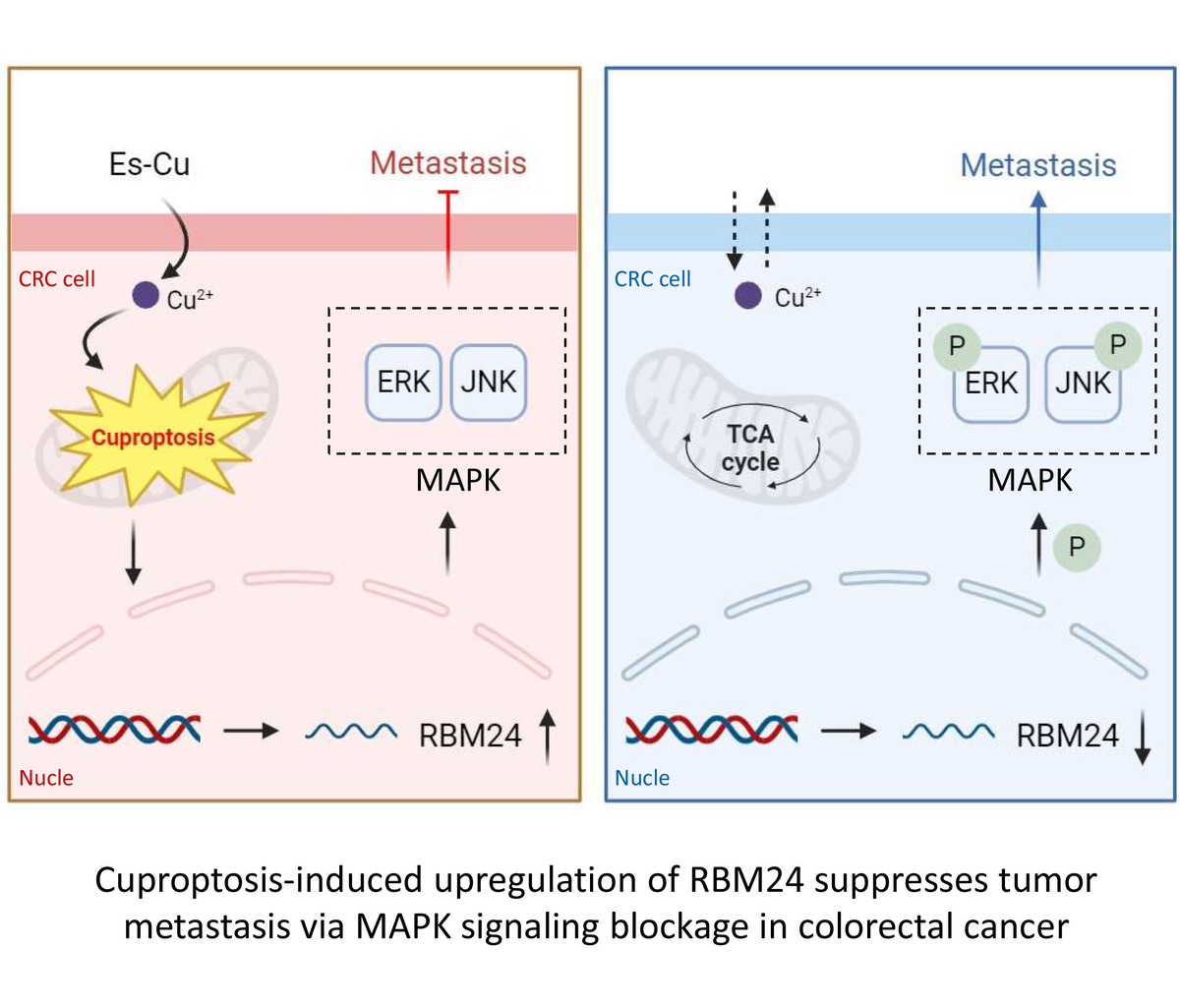Current issue
Archive
Manuscripts accepted
About the Journal
Editorial office
Editorial board
Section Editors
Abstracting and indexing
Subscription
Contact
Ethical standards and procedures
Most read articles
Instructions for authors
Article Processing Charge (APC)
Regulations of paying article processing charge (APC)
ONCOLOGY / RESEARCH PAPER
Cuproptosis-induced up-regulation of RBM24 suppresses tumor metastasis via MAPK signaling blockage in colorectal cancer
1
Anyang Tumor Hospital, China
Submission date: 2024-07-11
Final revision date: 2024-11-28
Acceptance date: 2024-12-19
Online publication date: 2025-04-20
KEYWORDS
TOPICS
ABSTRACT
Introduction:
Cuproptosis is an emerging form of programmed cell death that scientists are linking to tumor progression. Nevertheless, the link between cuproptosis and the metastatic process in colorectal cancer (CRC) is obscure to this day, as are the underlying molecular mechanisms that drive CRC progression in this process.
Material and methods:
Bioinformatics, quantitative reverse transcription polymerase chain reaction (qRT-PCR), immunofluorescence (IF), and Western blot (WB) were leveraged to analyze the expression levels of RBM24 in CRC. Cell counting kit-8 (CCK-8) assay, Transwell, and WB assays were conducted to determine the cell proliferation, migration, and invasive potential, alongside the expression analysis of metastasis-related proteins. Intracellular Cu2+ levels were quantified using a Copper Assay Kit. Additionally, the expression of mitogen-activated protein kinase (MAPK) pathway and cuproptosis-related proteins were probed via WB.
Results:
RBM24 was under-expressed in CRC, and its forced expression inhibited the metastatic abilities of CRC cells, including migration, invasion, and epithelial-mesenchymal transition (EMT). The use of a MAPK pathway inhibitor could temper the pro-metastatic effects associated with low RBM24 levels. On the molecular level, the combination of copper ionophores with copper ions (Es-Cu) up-regulated RBM24, leading to the inhibition of CRC cell spread. The effects of cuproptosis on CRC cells were nullified by knocking down RBM24.
Conclusions:
Elevated levels of cuproptosis-induced cell death disrupt the MAPK signaling cascade, thus suppressing the metastasis of CRC. This discovery sheds new light on the potential application of cuproptosis in oncological treatments.
Cuproptosis is an emerging form of programmed cell death that scientists are linking to tumor progression. Nevertheless, the link between cuproptosis and the metastatic process in colorectal cancer (CRC) is obscure to this day, as are the underlying molecular mechanisms that drive CRC progression in this process.
Material and methods:
Bioinformatics, quantitative reverse transcription polymerase chain reaction (qRT-PCR), immunofluorescence (IF), and Western blot (WB) were leveraged to analyze the expression levels of RBM24 in CRC. Cell counting kit-8 (CCK-8) assay, Transwell, and WB assays were conducted to determine the cell proliferation, migration, and invasive potential, alongside the expression analysis of metastasis-related proteins. Intracellular Cu2+ levels were quantified using a Copper Assay Kit. Additionally, the expression of mitogen-activated protein kinase (MAPK) pathway and cuproptosis-related proteins were probed via WB.
Results:
RBM24 was under-expressed in CRC, and its forced expression inhibited the metastatic abilities of CRC cells, including migration, invasion, and epithelial-mesenchymal transition (EMT). The use of a MAPK pathway inhibitor could temper the pro-metastatic effects associated with low RBM24 levels. On the molecular level, the combination of copper ionophores with copper ions (Es-Cu) up-regulated RBM24, leading to the inhibition of CRC cell spread. The effects of cuproptosis on CRC cells were nullified by knocking down RBM24.
Conclusions:
Elevated levels of cuproptosis-induced cell death disrupt the MAPK signaling cascade, thus suppressing the metastasis of CRC. This discovery sheds new light on the potential application of cuproptosis in oncological treatments.
We process personal data collected when visiting the website. The function of obtaining information about users and their behavior is carried out by voluntarily entered information in forms and saving cookies in end devices. Data, including cookies, are used to provide services, improve the user experience and to analyze the traffic in accordance with the Privacy policy. Data are also collected and processed by Google Analytics tool (more).
You can change cookies settings in your browser. Restricted use of cookies in the browser configuration may affect some functionalities of the website.
You can change cookies settings in your browser. Restricted use of cookies in the browser configuration may affect some functionalities of the website.



